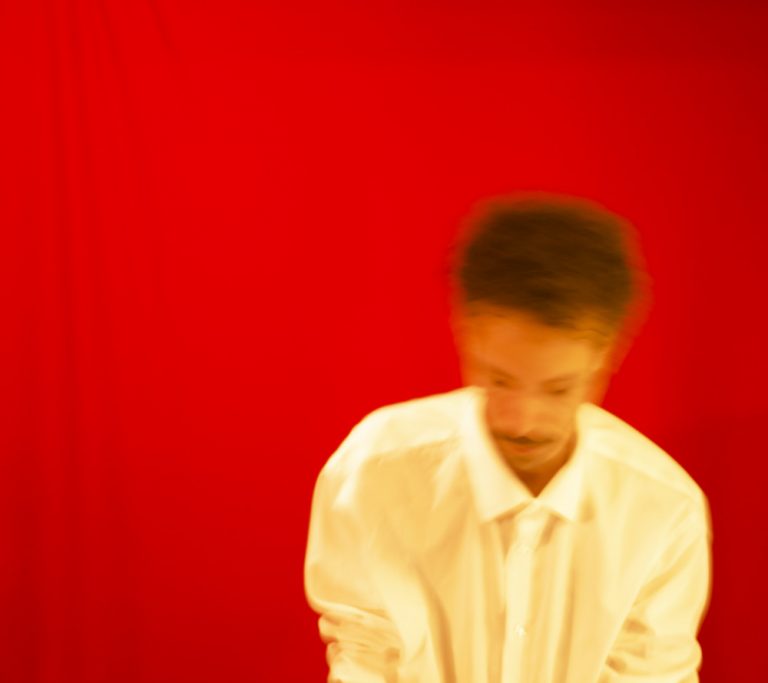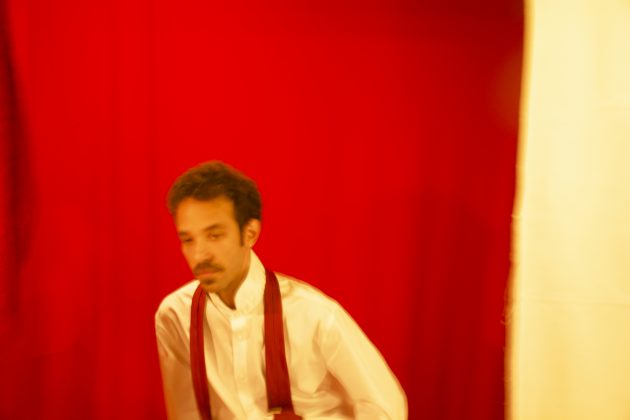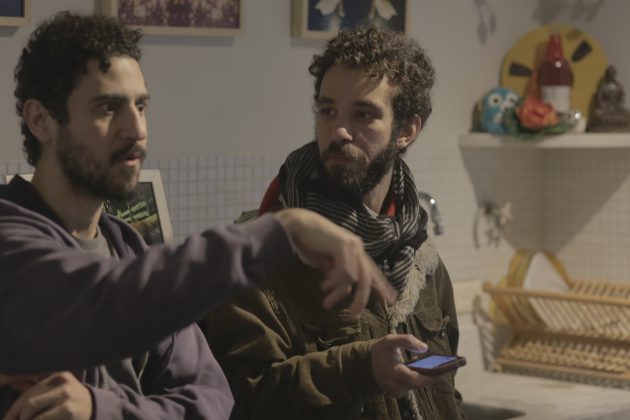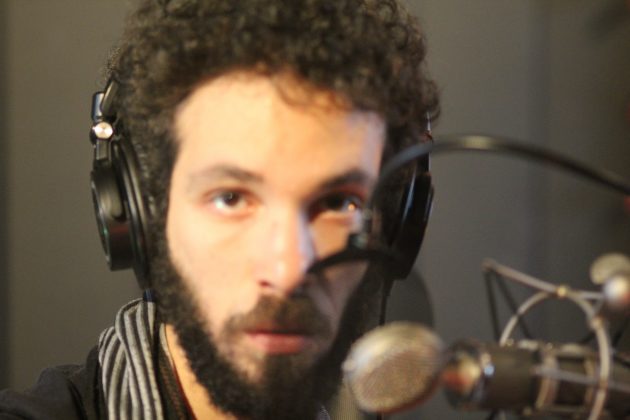
Sztu: A Fleeting “Lance” or Something Lasting?
15 October, 2020“I started writing songs when I was about fifteen years old, and at the same time I began to take seriously the possibility of dedicating myself to painting.” So explains the interdisciplinary artist André Sztutman who, in late August, released one of contemporary MPB’s most quietly complex statements, Lances. Put forward under the alias Sztu, Lances is delicate, meticulously arranged and full of vivid melodies. Sztutman’s first solo venture as a musical artist, also, sounds effortless. It’s surprising, then, that Sztutman confesses that he chose to pursue visual arts at a higher level “because, honestly, it would be much easier for me than music. Musicians have to study a lot – an exact, technical study that demands a lot of discipline . . . so I went to study visual arts, which was something more open – crazier.”
Besides a handful of caveats into the experimental music world – “In 2008, I started a band with some friends, Epicac Tropical Banda, which was an experimental project, with lots of improvisation with electronic interfaces” – music had remained a more private, intimate vocation of Sztutman’s before Lances. I ask him what he feels he can say with this medium that he can’t with the other.
“The visual artist who coined the term Tropicália, Hélio Oiticica, said: ‘what I do is music’. Pop singers, from Elvis Presley to Pablo Vittar, are great creators of images, and are themselves, their bodies, the supports for the creation of those images and the image itself. I think different mediums simply can’t live without each other . . . Sometimes, though, I think that, in visual arts, I operate in a more rational way, while music has been a space where I always welcome and prioritise emotional content.”
Sztutman makes clear his emotional relationship to music: “I have an almost devotional respect to the world of music, to musicians, instrumentalists, arrangers . . . I am a melomaniac: I really love the characters, the authors, the interpreters, the stories of the lyrics, the records, the poetry, mainly… And the impact of these works on our lives.”
His self-identified melomania is palpable; throughout our chats, Sztutman’s responses ooze with a passion for music’s history. The visual-arts graduate notes an incongruity between his private and scholastic passions: “I always had a good memory for music, knowing the names of musicians and producers and labels and dates of specific albums, whereas I never would remember the names of visual artists.”
Lances substantiates its creator’s keen musical memory; it is an album steeped in Brazilian popular music history. Around Lances’ release date, Sztutman explained to me that MPB was “a kind of sacred ring where I always wanted to set foot”. Indeed, his debut LP enters a musical tradition that has hugely shaped his life: “I feel the need to acknowledge the music that filled my ears, shaped my own repertoire of sounds and emotions, taught me the Portuguese language in a different way, and then taught me to speak, to write, to move . . . So I want to speak to those that came before me, establish a dialogue. My lyrics and music are full of coded signs, pastiches, collages, loans, thefts, tributes.”
So what music does he dialogue with? “The first song, ‘Nenhum Um’, makes reference to Som Imaginário, for example.” He references the album opener’s intricately building bridge section. “The way the guitar enters making tension and how the bridge evolves with almost an epic atmosphere… It wasn’t premeditated but its sound has something to do with Som Imaginário. It has that half-epic, half-baroque climate.”
Elsewhere, Sztutman finds inspiration in the “Bahian tropicalistas, Gil, Caetano and Gal Costa. But I wanted to be influenced by their more mature phases – Caetano’s records that were produced by Arto Lindsay in the 90s. I think ‘Resta Um Gesto’ comes from this reference point.
“But I don’t think those are the only indirect references in this music. The lyric division [in “Nenhum Um”] refers to other things, the repetition of words ‘nenhum / um / nenhum / um’, for example, refers more to concrete poetry and its influence on Brazilian music.”

Sztutman is vociferous, rifling through well-thumbed pages of twentieth-century Brazilian music history. At one point, after attempting to give a “compact” history of MPB and declaring it an “impossible” task, he references an academic essay he had written on the subject; it is, unsurprisingly, phenomenally well-researched, nuanced, eloquent. As “impossible” as Sztutman might find this undertaking, he still deftly traverses Brazil’s twentieth century, making incisive links between music a century apart:
“The twentieth century begins with samba being marginalised: it was forbidden to samba in the street, and sambistas were arrested and persecuted. By the 1990s, though, Carnival had already become a festival that moved millions of reais, and the samba school parades were televised for the whole country. In 2017 we have conservative groups wanting to criminalise funk dances in communities of Rio de Janeiro and São Paulo. So there has always been war here, there has always been, on the one side, the hatred of the white, Eurocentric financial elite against, on the other, the black and indigenous, peripheral popular culture. This hatred elected Bolsonaro in 2018.”
During his compact history, Sztutman dwells on Tropicália musicians’ incorporation of “anthropophagy – which was Oswald de Andrade’s [theory] in the 1920s, and before him, of course, the Tupinambá’s and other peoples’ since long before 1500. It is a matter of eating one’s enemy, the Other, the stranger, the foreigner, to absorb his strength, his characteristics, to integrate the Other into himself.”
Sztutman continues: “Tropicália wanted to make a bridge between worlds, to reconcile artisanal, telluric, popular music with, for example, the big recording industry. Anthropophagy is a tool that the whole world should understand better. It is a precolonial, Native Amerindian technology that could be used to fight the disease of European fascism and Nazism, or the crisis between Palestine and Israel.”
I ask Sztutman if Lances practises musical anthropophagy. “Yes, but in a different way from the Tropicália of the late 60s. Perhaps anthropophagy for me is more of a way of making music using those resources of pastiche, citation, loan, theft… and less as a statement in itself. It’s more of a tool than an ideology.”
“We sit at the same table as those musicians who came before, drink the same water, but we speak the language of 2020, which is a different language from that of the 70s, for example.“
As an album that pastiches, loans from and cites a musical canon, I ask Sztutman whether he believes all artists have a role in responding to their medium. “I think so. But it is never about fitting the model defined by the canon. It’s something political to position oneself in relation to the medium, and in relation to the stories and memories that the medium contains . . . We have to communicate with tradition without being nostalgic . . . We sit at the same table as them, drink the same water, but we speak the language of 2020, which is a different language from that of the 70s.
“So we try to revitalise the tradition that, in turn, vitalised our own lives. It is important to revere those who came before: Tom Zé, Caetano, Zé Celso, are all over or around 80 years old. Itamar Assumpção has gone but has also left a giant legacy which difficult to carry because it is more of a force than a form. I feel like corresponding with that, you know? And then from that I can try to do something singular – not necessarily new, not totally free of categorisations, but something hybrid and singular, something strange and familiar at the same time.”
Sometimes Sztutman is an incongruous mix – a devotee of Brazilian musical history and tradition, but equally an artistic anarchist, espousing freedom and indiscipline. “I think our creative desire has nothing to do with discipline. Desire is not disciplined; it cannot be a straight line,” he avows. Though recorded in 2017, the interdisciplinarian postponed Lances’ release because he went to Bogotá to enrol in an Interdisciplinary Masters in Artes Vivas (Live Arts). “I will paraphrase a professor I had in Colombia, Rolf Abderhalden, who says to observe how in-disciplinary is camouflaged in the word in(ter)disciplinary.”
Sztutman declares the frenetic “Bicho Esquerdo” (“Left-Handed Animal”) “an elegy to indiscipline”. Its lyrics are a refutation of all one might consider normative: “Foda-se a encomenda/ Furo greve de fome/ Como mulher como homem” (“Fuck the order/ Hunger strike/ As a woman as a man”). I ask Sztutman about these lines:
“It’s a lyric that talks about the possibility – and the necessity – of not being normative. The word ‘como’ in Portuguese has two meanings: the verb, to eat in the singular present is ‘eu como’. But, also, the word ‘como’ (‘like’) is also a word that indicates similarity and is used in metaphors. So the passage from the song: “furo greve de fome/ como mulher como homem” means that I go on strike as a man (as a man) and as a woman (as a woman). But also that the subject of the music eats (has sex) with men and with women. It is a purposeful ambiguity.” The subject of the song, like T. S. Eliot’s Tiresias, ‘throbs between two lives’. They are non-binary, and bisexual – two things Bolsonaro and his vile gender ideology publicly denounce. “Bicho Esquerdo” ends with the disjointed sentence: “Aquele que você não é” (“[I am] that which you’re not”).
I comment that “Bicho Esquerdo” reminds me of parts of Negro Leo’s latest album – both its lyrics’ sentiment and fast-paced, fragmented delivery. “I am very happy – Negro Leo is a very fucked-up artist, who does something that I see resonate with other artists like Bruno Schiavo, Ana Frango Elétrico and, of course, Ava Rocha. These people provoke me as an artists, make me want to update myself, make my lyrics and music more radical – radically in the now.”

Sztutman speaks like a militant musician engaged in a political struggle against his country’s conservative elite – like many of musical influences were before, including the once-exiled Gil and Veloso. I pursue Sztutman’s musings on in(ter)discipline.
“What is undisciplined [on Lances] is simply the fact that I move from visual arts to music, breaking the logic of a career-construction situated in specialised niches – of competence, for example, which is an essentially capitalist logic, aimed at increasing productivity, and which limits us greatly . . . But this is not a great act of revolution,” he laughs, “not least because my privileges as a middle-class white man with access to the education I’ve had has made it much easier for me to make these displacements.
“I think that one way to distance oneself from the capitalist logic, though, is not to let one’s desire be colonised, captured, guided by this logic. In order to do this, it is necessary to listen to desires – not those socially manipulated desires, such as desire for power, consumption, etc… But another type of desire – what is really vital for us.”
To me, he sounds like a Frankfurt School disciple, hellbent on fighting cultural hegemony, exalting Herbert Marcuse’s eros over civilisation. “I was very fond of anarchists – I still am… But in the last few years I’ve immersed myself more in Deleuzian readings – thinking about the micro-politics of affections and desires. When I enter a bookshop, though, I don’t go to the philosophy section – I go to the poetry section.”
Indeed, for all our conversation on philosophies of indiscipline, Lances is beautifully spacious, painstakingly arranged, disciplined and bursting with poetry. Sztutman concurs: “being undisciplined here does not simply mean being careless or making an aggressive effort against a discipline. In fact, Lances is meticulously organised – we worked hard on the arrangements and sensations that each composition demanded.”
The title-track is one such meticulously arranged song. The tender violão, playing colourful extended chords between chromatic bass movements, is paired with a warm, breathy fluegelhorn. It’s one of the album’s most sparse, gentle moments, and “plays a central role in the record” – not least because of its lyrics that set out the album’s central idea. I asked Sztutman about the word “lance” prior to reviewing his album last month.
“A ‘lance’ is something fleeting, but I think it’s still something impactful – something that moves us.”
“‘Lance’ in Portuguese can mean several things. It can be understood as a gesture, a fleeting move, like a move in a football game, or a dice throw. But we also use the word to refer to a casual fling. There is an old carioca funk tune by MC Smith that goes: ‘a ‘lance’ is a ‘lance’, a ‘lance’ is not a romance’. In other words, a ‘lance’ is not something serious, it has no commitment, it’s just a ‘lance’.
“It also has to do with time. Because a ‘lance’ is something fleeting, but I think it’s still something impactful – something that moves us. The word refers to Mallarmé’s poem Um Lance de Dados jamais abolirá o acaso [A Throw of the Dice will Never Abolish Chance]. It is a landmark of modern poetry which opens up the possibility of using words in a plastic, concrete way – Mallarmé’s radical gesture had a lasting effect on Brazil’s concrete-poetry vanguard. And it’s a poem that speaks of chance, luck, randomness, of the impression of time, and the fugacity and impact that these incandescent events have on us.”
I tell Sztutman it seems like a tactful way of being self-deprecating, to name his first solo release “Lances” – a kind of playing-down of something that’s actually not so fleeting (especially as it has been living, unreleased, for three years already). “Sure, it’s a way to escape from big statements. But I also don’t think it’s an opportunity to be self-deprecating. Rather, it’s an opportunity to use language to show how beauty can be found more in the fragile and vacillating than the strong.”
Sztutman’s album – both sonically and lyrically – is a celebration of fragility, and of smallness. The first line of album opener “Nenhum Um” reads: “Nada nas mãos”, “Nothing in my hands”.
“Putting that song at the beginning of the album was Sessa’s idea”, Sztutman explains. “He said it’d be beautiful to start the album like this and I agreed. It’s that feeling of arriving somewhere with nothing to offer, no recognition.” Fellow MPB musician Sessa, released his celebrated debut album last year. Ironically, his album is titled Grandeza, which translates to “greatness”, or “grandeur”. For Sztu, though, “the anti-monumental will always be more interesting than the monumental. The smallness, the insignificance, the imperfection… I like how Japanese Wabi-Sabi accepts and cultivates imperfection and transience.”
The pleasure Sztutman finds in smallness, he also finds in silence. Lances is an album that savours its silences – particularly on the tempo rubato closer, “Rio Pra Ir A Irará”. And, in the appended academic article that he sent me, there’s a particularly stimulating passage about being silent:
“Silence lends the malandro his ideal position. There, he listens to everything attentively, he’s alert and at the same time, out of sight. It’s a strategic position, a struggle for survival, play, dialogue, conversation, negotiation . . . In 1968, antidemocratic and authoritarian measures intensified with the notorious law known as Institutional Act No. 5 (acronym in Portuguese: AI-5) which institutionalized censorship and torture in Brazil by suspending all constitutional guarantees . . . [and] torture can be seen as an institutional procedure against silence.”
I raise the topic in our conversations later: “I value the silence of songs very much – and I’m even impressed with how some current Carioca funk tracks sustain huge amounts of silence, often with just a rhythmic sampler and voice, without a lot of filling. I find it really sophisticated. A lyric with good divisions, good doses of silence, can also penetrate the listener more…”

Our chatting moves to Colombia, where Sztutman has spent the last three years studying, and how he felt as a Brazilian expat during a time of such political and social unrest.
“I arrived in Bogotá in 2017, a few months after the coup that overthrew Dilma [Rousseff], and lived there until the end of Bolsonaro’s first year as president. During that time there was the fire at the national museum, the collapse of the dam in Brumadinho and the murder of Marielle Franco in 2018. There were many hard, systemic blows, which continue. It was all I saw – the shit that happened every day. Brazil was always the stage of a real-time dystopia, but what was already bad got worse, and to see from outside was difficult, I felt like an exile . . . At the same time I discovered more about Colombian culture. It’s absurdly rich and powerful, and equally unfair and tragic.”
I wonder if, in Brazil’s current political reality, Sztutman finds the lyrics he wrote in 2017 to hold different meanings now? “Yeah. Before releasing the record I was very concerned about that. Lances is very sweet, really, and I was afraid it would sound alienated. However, when it was released, I found this sweetness a good thing; it ended up being dissonant with the current moment.”
On one of Lances more spirited songs “Resta Um Gesto”, a 2017 Sztutman sings as if he could have foreseen Brazil’s and the world’s current crises. I ask him about the title, which translates to “A Gesture Remains”. “It first came from the mouth of a friend, Pedro Maia. It’s good because it presupposes that there’s a way out of our dystopian situation – there’s that old charade of the difficult-simple: all that remains to be done is a gesture. It’s something so simple! And it’s almost like a ‘lance’ – it has that characteristic of being something fleeting or fast. Like, for example, billionaires could, together, with a gesture, end world hunger, the precariousness of health systems, and ecological problems… But they don’t. Sometimes we’re just a gesture away from a solution.”
And do you feel compelled to tackle Brazil’s current predicament on a future album? “Yes, I have a sketch of the next solo album. I have some unfinished songs, the tone of which are rooted in the terrible feeling of Brazil’s current reality. But I’m also trying to protect myself a little from partaking in an excess of information, or a feeling of non-conformity which, at the same time, can be impotent in the face of the political scenario of Brazil and the world. So I am still thinking about the best way to attack these critical moments that we’re living out… I don’t know yet how to talk about it, it is necessary to find a voice to talk about these things.”
It’s an unusual time to have released a debut album: “I wanted to be in Brazil to release the album, that was important for me. Ironically, when I came back to Brazil, I ended up releasing it in conditions of social distancing.” But Sztutman sees a silver lining: “I’m enjoying the slow diffusion of the album and talking to the people who’ve listened to it. It’s about escaping the aesthetics of advertising – I generally like pop culture and communicate with and absorb elements of that world. But I think I make an effort to not turn my album into just another product, you know? Nobody can take that anymore… I can’t take it anymore.”
“I just thought that, in a way, a ‘lance’ is like a product, because it’s something you consume, it’s disposable and short-lived. But what I ask myself on the record is precisely if there’s any gesture, or any ‘lance’ that – however ephemeral – can last longer, can leave a trail, a memory… It’s that trail that matters to me.”
Lances by Sztu is out now on Selo Traste:
Follow Sounds and Colours: Facebook / Twitter / Instagram / Mixcloud / Soundcloud / Bandcamp
Subscribe to the Sounds and Colours Newsletter for regular updates, news and competitions bringing the best of Latin American culture direct to your Inbox.

